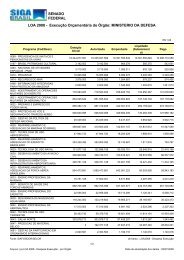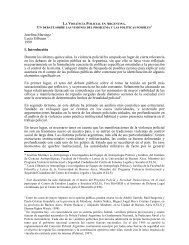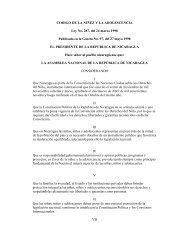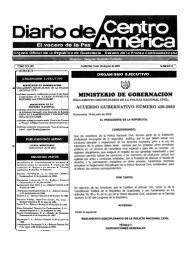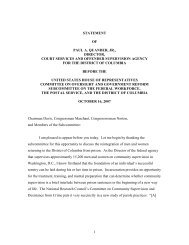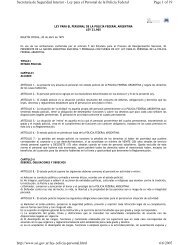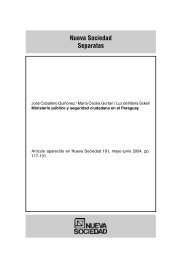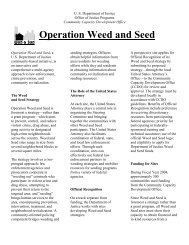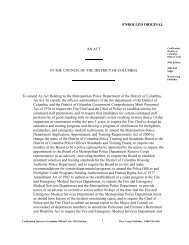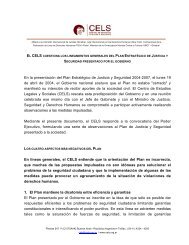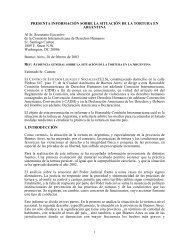Venezuela: The Life and Times of the Party System - Political ...
Venezuela: The Life and Times of the Party System - Political ...
Venezuela: The Life and Times of the Party System - Political ...
Create successful ePaper yourself
Turn your PDF publications into a flip-book with our unique Google optimized e-Paper software.
Prospects for <strong>the</strong> Future<br />
<strong>Political</strong> parties <strong>and</strong> <strong>the</strong> system built around <strong>the</strong>m (<strong>the</strong> party system, in our terms) have<br />
contributed mightily to <strong>the</strong> creation <strong>and</strong> survival <strong>of</strong> democracy in <strong>Venezuela</strong>. <strong>The</strong> plus side <strong>of</strong> <strong>the</strong><br />
political ledger is long, <strong>and</strong> <strong>the</strong> parties deserve credit for what <strong>the</strong>y have accomplished. Mass<br />
publics have been incorporated into politics; high rates <strong>of</strong> participation have been combined with<br />
enduring stability; debilitating ideological polarization has been set aside; <strong>and</strong> threats <strong>of</strong><br />
overthrow, insurrection, atomization, vote dispersion, <strong>and</strong> political fragmentation have all been<br />
overcome. Success in <strong>the</strong>se efforts has been due, above all, to <strong>the</strong> combination <strong>of</strong> strong party<br />
organization, effective leadership, <strong>and</strong> an evolving democratic political culture. To be sure, past<br />
success is no guarantee <strong>of</strong> present or future virtue. Politics everywhere asks ‘what have you<br />
done for me lately?’ <strong>and</strong> even accounting for <strong>the</strong> force <strong>of</strong> memory, it is <strong>the</strong>refore appropriate, in<br />
conclusion, to consider not only what <strong>the</strong> parties have achieved, but also <strong>the</strong> dilemmas <strong>and</strong><br />
challenges now emerging for <strong>the</strong> future. For <strong>the</strong> <strong>Venezuela</strong>n party system to survive <strong>and</strong> <strong>the</strong><br />
democracy it has built to consolidate <strong>and</strong> prosper in <strong>the</strong> future, avoiding ano<strong>the</strong>r sad February in<br />
<strong>Venezuela</strong>, three challenges must be addressed: coping with economic scarcity, accommodating<br />
dem<strong>and</strong>s for new channels <strong>of</strong> participation, <strong>and</strong> controlling <strong>the</strong> military.<br />
Throughout most <strong>of</strong> its modern history, an exp<strong>and</strong>ing economy <strong>and</strong> overflowing treasury<br />
have given <strong>Venezuela</strong>’s leaders room to maneuver <strong>of</strong>ten denied to <strong>the</strong>ir colleagues elsewhere in<br />
<strong>the</strong> hemisphere. Governments could count on ever-increasing income, with no need to take from<br />
anyone in order to increase <strong>the</strong> overall pie. Income taxes were essentially unknown. But <strong>the</strong><br />
economic crisis (drop in oil prices, devaluation, inflation, <strong>and</strong> a large fiscal deficit) <strong>of</strong> <strong>the</strong> 1980s<br />
has raised questions about <strong>the</strong> ability <strong>of</strong> this system to operate in such different circumstances.<br />
Without abundant resources to distribute, <strong>the</strong> role <strong>of</strong> <strong>the</strong> state will have to shift, from dominant<br />
player to one actor among many. Thus far, efforts to reorient <strong>the</strong> role <strong>of</strong> <strong>the</strong> state <strong>and</strong> <strong>the</strong> pattern<br />
<strong>of</strong> public policy begun under <strong>the</strong> second government <strong>of</strong> Carlos Andrés Perez in 1989 have had<br />
mixed results. At <strong>the</strong> very least it is clear that interelite pacts buttressed by organizational<br />
mechanisms to channel <strong>and</strong> control discontent can no longer be relied upon.<br />
Accommodating new channels for citizen participation <strong>and</strong> in this way ‘democratizing<br />
democracy’ has been central to <strong>the</strong> reform programs under way for over a decade. It is important<br />
to realize that pressure for reform has roots that extend well beyond institutional engineering <strong>and</strong><br />
<strong>the</strong> details <strong>of</strong> altered electoral systems. One way to grasp <strong>the</strong>se pressures is to see <strong>the</strong>m as <strong>the</strong><br />
results <strong>of</strong> democracy itself. Pressures for reform <strong>of</strong> <strong>the</strong> parties <strong>and</strong> <strong>the</strong> party system gain strength<br />
from an organized civil society that simply did not exist when <strong>the</strong> party system took on its current<br />
form. <strong>The</strong> characteristics <strong>of</strong> <strong>Venezuela</strong>n political parties noted in this chapter—centralization,



